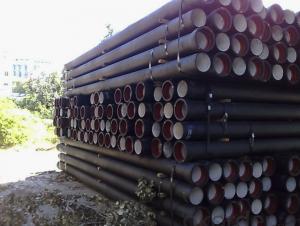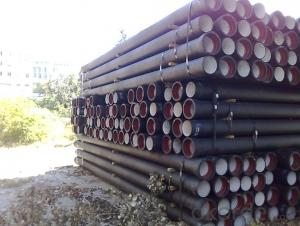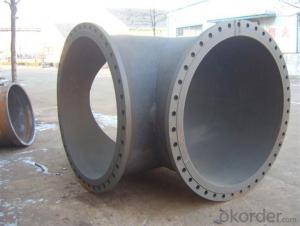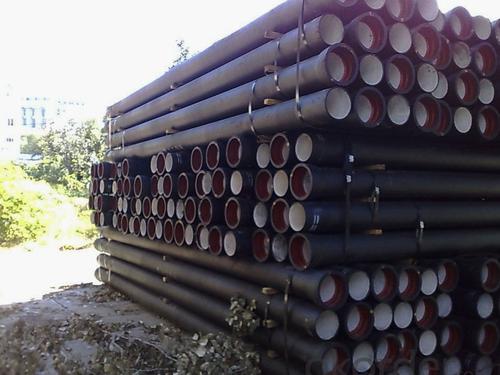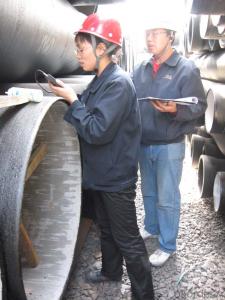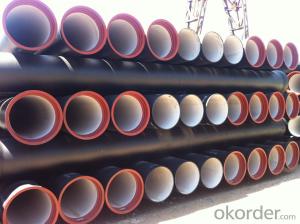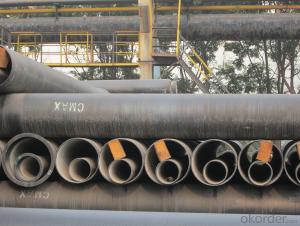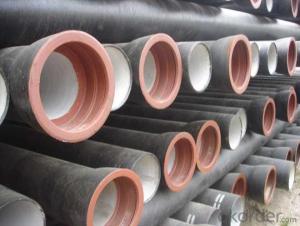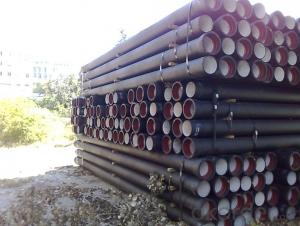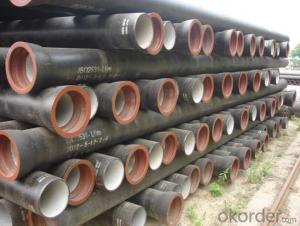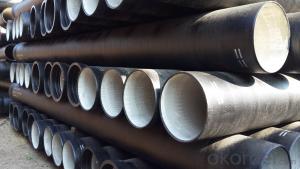Ductile Iron Pipe High Quality DN150-DN500 EN545/EN598/ISO2531 C25 Made in China
- Loading Port:
- China main port
- Payment Terms:
- TT or LC
- Min Order Qty:
- 25 m.t.
- Supply Capability:
- 50000 m.t./month
OKorder Service Pledge
OKorder Financial Service
You Might Also Like
1. Ductile Iron Pipe Description :
1) Pipes confirm to ISO2531,K9 class,T type joint,6m long,with inside cements lining conform to ISO4179, outside Zinc spraying(130g/m2) and bitumen coating(70μm) conform to ISO8179.
2) Pipe ends: Spigot and socket ends, with 100% SBR rubber gaskets accoding to ISO4633
3) we can do third party inspection according to customer's request.
4) Our products have been sold to many international market, such as Middle East and South East Asia and Africa.
2. Main Features of the Ductile Iron Pipe:
• Chemical checking
• NDE after rough machining
• Mechanical testing after heat treatment
• Final NDE,dimension inspected
2).Quality document
• Full Q.A document as per client request
3).Packing and Shipping
• standard export package(carton/wooden case/pallet)
• accept FOB,FAS,CNF,CIF door to door etc or customer designated shipping agent
4).Service
• Drawing: we can translate your original drawing, offer best suggestion on design
• Quality: we have full set quality control system to guarantee the best quality.
• Inspection: inspect in house, all our products must be checked 3 times before packing
5).Inspection
• In-house Foundry
• Third party inspection available upon requirement
6).Our goal
• To be your preferred partner
3. Ductile Iron Pipe Images:
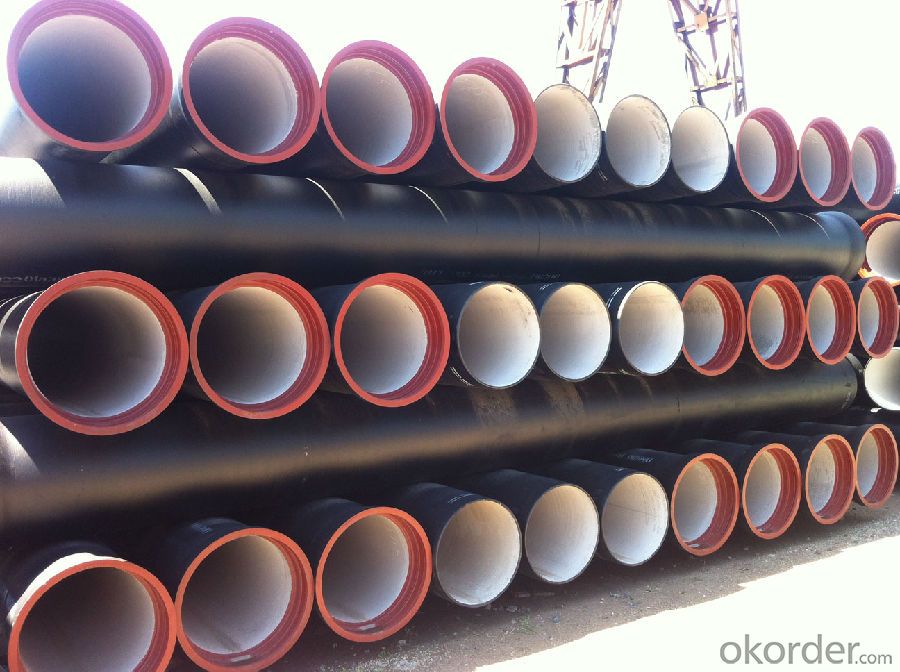
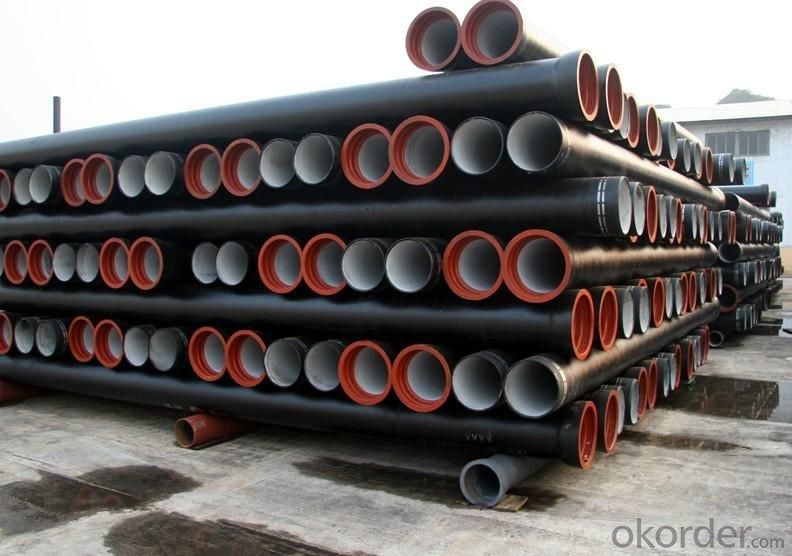
4. Ductile Iron Pipe Specification:
Surface Finishes: Bare, Oiled, Mill Varnish, Galv,FBE, FBE Dual, 3LPE, 3LPP, Coal Tar,Concrete Coating and Tape Wrap
End Finishes: Beveled, Square Cut, Threaded, hat
Additional Services: Internal Coating
Packaging: packed in bag, plastic bag, steel strip, steel wire,double wire, iron box, wooden box, tarpaulin, plastic sheeting
Inspection: MOODY SGS BV GL DNV ABS LIOYD’S
Test: X-ray, UT, magnetic particle,inspection,hydrostatic test.
Processing service: Beveling, Threading, Slotting, Cut-to length, Bends, Quench and Temper, Fabrication, Double-jointing and On-site assistance
Documentary: MTC, material certification,Origin certification, CI or PI,Test Report, export licence, handling order, B/L,insurance policy,shipping instructions, contract, packing list etc.
Length: 3 - 12 m according to requirment
Note: Other grade can also be provided after consulting. Special design are available for coal slurry
conveyance LSAW line tube -- Service
Internal lining: ductile iron pipes shall have an internal cement mortar lining in acc with ISO4179.
5. FAQ:
1.Q: Why would you choose ductile iron pipe rather than other pipe materials?
A:The reasons are obvious for that not only ductile iron pipe possesses the inherent strength and flexibility of ductile iron, combined with proven corrosion protection systems, but also the cost savings can be achieved from design to installation and commissioning.
2.Q:Why can you guarantee the inner of pipes can’t be corroded?
A: High alumina cement mortar lining and sulphate-resistant cement mortar lining. These two special linings are applicable to inner anti-corrosion for sewage pipes, improving resistance to erosion of the sewage components.
- Q: How do ductile iron pipes perform in high-temperature water applications?
- Ductile iron pipes perform well in high-temperature water applications due to their inherent strength and durability. They can withstand the elevated temperatures without losing their structural integrity, making them an ideal choice for conveying hot water.
- Q: What is the maximum operating pressure for ductile iron pipes?
- The maximum operating pressure of ductile iron pipes may vary based on factors like pipe diameter, wall thickness, and the specific usage. Nonetheless, typically, ductile iron pipes are engineered to endure pressures of up to 350 psi (pounds per square inch), and occasionally even higher. It is worth highlighting that to ascertain the precise maximum operating pressure for a specific ductile iron pipe system, one should refer to local regulations, engineering standards, and manufacturer specifications.
- Q: Are ductile iron pipes suitable for underground storage tanks?
- No, ductile iron pipes are not suitable for underground storage tanks.
- Q: Can ductile iron pipes be used for underground oil and gas pipelines?
- Yes, ductile iron pipes can be used for underground oil and gas pipelines. Ductile iron is a strong and durable material that can withstand high pressure and corrosive environments, making it suitable for such applications. Additionally, its flexibility allows it to accommodate ground movement and settle effectively, reducing the risk of damage to the pipelines.
- Q: What is the expected fatigue life of ductile iron pipes under cyclic loading?
- The expected fatigue life of ductile iron pipes under cyclic loading can vary depending on various factors such as the magnitude and frequency of the cyclic loading, the quality of the material, the design and installation of the pipes, and the environmental conditions. Ductile iron is known for its high strength and ductility, which enables it to withstand cyclic loading to a certain extent. However, like any other material, it is also susceptible to fatigue failure over time. To estimate the expected fatigue life of ductile iron pipes, engineers often utilize fatigue analysis and testing methods. These methods involve subjecting representative samples of the pipes to cyclic loading under controlled conditions and measuring the number of cycles required for failure to occur. The results of these tests are then used to extrapolate the expected fatigue life of the pipes under similar loading conditions. It is important to note that the expected fatigue life can vary significantly depending on the specific conditions and loading patterns experienced by the pipes in a given application. Therefore, it is crucial to consider factors such as the operational demands, maintenance practices, and the overall structural integrity of the pipeline system. Additionally, the use of appropriate design standards and guidelines, along with regular inspection and maintenance, can help enhance the fatigue life of ductile iron pipes. In summary, while it is challenging to provide a specific value for the expected fatigue life of ductile iron pipes under cyclic loading, engineers can estimate it through fatigue analysis and testing methods. It is essential to consider various factors and maintain the pipes properly to ensure their longevity and prevent potential failures.
- Q: How do ductile iron pipes handle ground movement or settlement?
- Ductile iron pipes are known for their exceptional strength and flexibility, which allows them to handle ground movement or settlement effectively. Ground movement or settlement refers to the natural shifting or settling of the earth's surface, which can put stress on underground infrastructure like pipes. When it comes to ground movement, ductile iron pipes have the advantage of being able to withstand and absorb the pressure and movement caused by the shifting soil. The ductility of the material allows the pipes to flex and bend to a certain degree without breaking. This flexibility helps to distribute the load and minimize the potential for damage. Moreover, ductile iron pipes have a high resistance to cracking or fracturing, even under extreme conditions. This resilience is due to the unique microstructure of the material, which provides excellent tensile strength and impact resistance. As a result, ductile iron pipes can withstand external forces and ground settlement without compromising their integrity. To further enhance their ability to handle ground movement or settlement, ductile iron pipes are often installed using flexible joints. These joints allow for slight movement and accommodate any shifting or settling of the ground. Additionally, proper bedding and backfilling techniques are employed during installation to provide additional support and stability. Overall, ductile iron pipes have a proven track record in handling ground movement or settlement. Their strength, flexibility, and resistance to cracking make them a reliable choice for underground infrastructure, ensuring the longevity and efficiency of water distribution systems.
- Q: How to correctly measure ductile iron pipe
- The outer diameter of the ball tube is measured around the outer edge of the pipe. The caliper is used to measure the inside diameter of the pipe. The length of the pipe is measured by a ruler or tape measure,
- Q: What is the ductile cast iron pipe
- Have not heard of the nodular cast iron pipe pipe, ductile iron may be a tube or a certain short tube is referred to as excellent grade.
- Q: How are ductile iron pipes tested for quality assurance?
- Ductile iron pipes are tested for quality assurance through various methods such as hydrostatic testing, visual inspection, and mechanical testing. Hydrostatic testing involves subjecting the pipes to high-pressure water to check for any leaks or weaknesses. Visual inspection is carried out to identify any surface defects or irregularities that may affect the quality of the pipe. Mechanical testing includes conducting tensile strength tests, elongation tests, and hardness tests to ensure that the pipes meet the required standards and can withstand the intended application. These testing procedures help ensure the quality and reliability of ductile iron pipes.
- Q: What is the expected corrosion rate of ductile iron pipes?
- The expected corrosion rate of ductile iron pipes can vary depending on various factors such as the environment, water chemistry, and protective coatings. However, on average, ductile iron pipes typically have a corrosion rate of around 0.1 to 0.5 millimeters per year.
Send your message to us
Ductile Iron Pipe High Quality DN150-DN500 EN545/EN598/ISO2531 C25 Made in China
- Loading Port:
- China main port
- Payment Terms:
- TT or LC
- Min Order Qty:
- 25 m.t.
- Supply Capability:
- 50000 m.t./month
OKorder Service Pledge
OKorder Financial Service
Similar products
Hot products
Hot Searches
Related keywords
